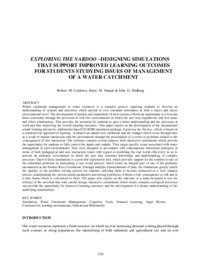Exploring the nardoo –designing simulations that support improved learning outcomes for students studying issues of management of a water catchment

View/Open
Date
2003Author
Corderoy, Robert. M.
Harper, Barry. M.
Hedberg, John. G.
Metadata
Show full item recordAbstract
Whole catchment management of water resources is a complex process requiring students to develop an understanding of systems and processes which operate at over extended timeframes at both a macro and micro environmental level. The development of models and simulations of such systems affords an opportunity to overcome these constraints through the provision of 'risk free environments' in which the user may hypothesise and test cause and effect relationships. This provides the potential for students to gain a better understanding and the processes at work and thus improving the overall learning outcomes. This paper reports on the development of the international award winning interactive multimedia based CD ROM simulation package, Exploring the Nardoo, which is based on a constructivist approach to learning . It models an inland river catchment and the changes which occur through time as a result of human interaction with the environment through the presentation of a series of problems related to the consequences of this interaction. The software contains several purpose built interactive simulations which provide the opportunity for students to fully control the inputs and outputs. They target specific issues associated with water management in such environments. They were designed in accordance with contemporary theoretical principles in terms of both pedagogical and user interaction issues with regard to modelling the real world effectively so as to provide an authentic environment in which the user may construct knowledge and understanding of complex processes. Each of these simulations is a powerful exploratory tool, which provides support for the solution to one of the embedded problems by mimicking a 'real world process' which forms an integral part of one of the problems encountered in the Nardoo River Catchment. Through multiple representations of data, the simulations greatly enrich the 'quality' of the problem solving process for students, allowing them to become immersed in a 'real' situated process, manipulating the various causal parameters and testing hypotheses without a 'real' consequence or risk and in a time frame which is convenient to them. The paper also reports on the outcome of a study designed to test the efficacy of the assertion that with careful design, interactive simulations which mimic complex ecological processes can provide the opportunity for improved learning outcomes and the development of a deeper understanding of the underlying relationships.